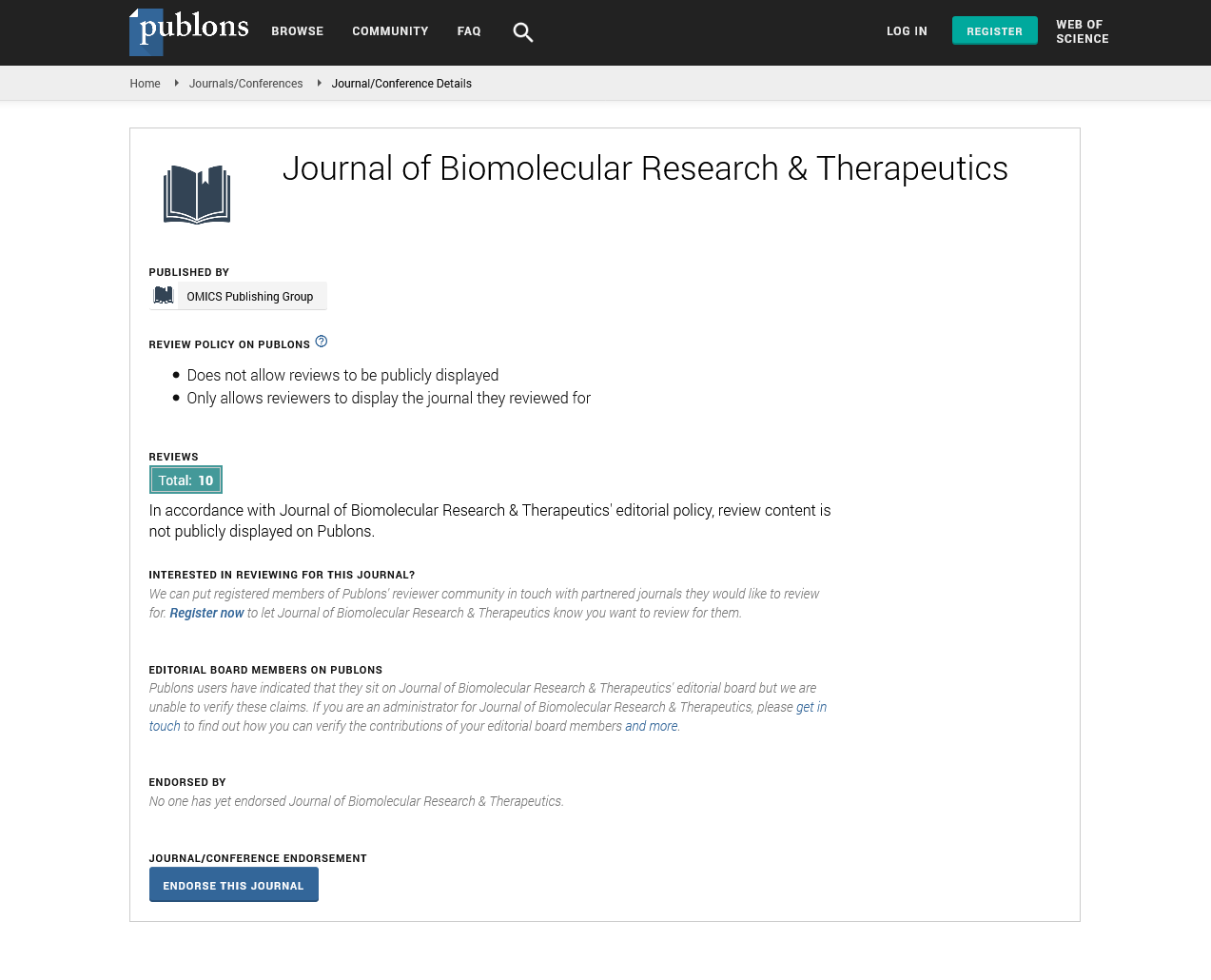Indexed In
- Open J Gate
- Genamics JournalSeek
- ResearchBible
- Electronic Journals Library
- RefSeek
- Hamdard University
- EBSCO A-Z
- OCLC- WorldCat
- SWB online catalog
- Virtual Library of Biology (vifabio)
- Publons
- Euro Pub
- Google Scholar
Useful Links
Share This Page
Journal Flyer

Open Access Journals
- Agri and Aquaculture
- Biochemistry
- Bioinformatics & Systems Biology
- Business & Management
- Chemistry
- Clinical Sciences
- Engineering
- Food & Nutrition
- General Science
- Genetics & Molecular Biology
- Immunology & Microbiology
- Medical Sciences
- Neuroscience & Psychology
- Nursing & Health Care
- Pharmaceutical Sciences
Opinion Article - (2024) Volume 13, Issue 2
Epigenetic Changes as Therapeutic Objectives: Advances in Chromatin Biology and Cancer Therapy
Takahiro Saito*Received: 01-Apr-2024, Manuscript No. BOM-24-25904; Editor assigned: 03-Apr-2024, Pre QC No. BOM-24-25904 (PQ); Reviewed: 17-Apr-2024, QC No. BOM-24-25904; Revised: 24-Apr-2024, Manuscript No. BOM-24-25904 (R); Published: 02-May-2024, DOI: 10.35248/2167-7956.24.13.380
Description
Epigenetics, genetics, has emerged as a pivotal field in understanding how gene expression is regulated without altering the DNA sequence. Epigenetic modifications, such as DNA methylation, histone modifications, and non-coding RNAs, play a major role in normal development, cellular differentiation, and disease pathogenesis. In recent years, epigenetic changes have become significant in therapeutic targets, particularly in cancer therapy. This article explores the advances in chromatin biology, the role of epigenetics in cancer, and the development of epigenetic-based therapies.
Understanding chromatin biology and epigenetic regulation
Chromatin, the complex of DNA and proteins found in the nucleus of eukaryotic cells, undergoes dynamic changes that regulate gene expression. The basic unit of chromatin is the nucleosome, consisting of DNA wrapped around histone proteins. Chromatin structure can be modified by epigenetic mechanisms, influencing the accessibility of genes to transcription factors and RNA polymerases.
DNA methylation: DNA methylation involves the addition of methyl groups to cytosine bases, typically occurring at CpG dinucleotides. Methylation patterns are heritable and can regulate gene expression by blocking transcription factor binding or recruiting methyl-binding proteins.
Aberrant DNA methylation, such as hypermethylation of tumor suppressor genes or hypomethylation of oncogenes, is important for cancer and other diseases.
Histone modifications: Histone proteins can undergo various post- translational modifications, including acetylation, methylation, phosphorylation, and ubiquitination. These modifications alter chromatin structure and regulate gene expression by affecting nucleosome stability and the recruitment of chromatin remodeling complexes.
Histone modifications are dynamic and reversible, allowing for precise control of gene activity in response to environmental cues and cellular signaling pathways.
Non-coding RNAs: Non-coding RNAs, such as microRNAs (miRNAs) and long non-coding RNAs (lncRNAs), plays an important roles in epigenetic regulation. miRNAs can post- transcriptionally silence gene expression by binding to target mRNAs and promoting their degradation or inhibiting translation.
Dysregulation of non-coding RNAs is implicated in cancer and other diseases, making them potential targets for therapeutic intervention.
Epigenetic dysregulation in cancer
Cancer is characterized by widespread alterations in the epigenome, including global changes in DNA methylation patterns, aberrant histone modifications, and dysregulated expression of non-coding RNAs. These epigenetic changes contribute to tumor initiation, progression, and metastasis by silencing tumor suppressor genes, activating oncogenes, and promoting genomic instability.
DNA methylation in cancer: Hypermethylation of CpG islands in promoter regions can silence tumor suppressor genes involved in cell cycle regulation, DNA repair, and apoptosis. Promoter hypermethylation of genes like p16INK4a, MLH1, and BRCA1 is frequently observed in cancer.
Hypomethylation of repetitive DNA sequences and oncogenes can lead to genomic instability and aberrant gene expression, promoting tumor development.
Histone modifications in cancer: Altered histone modifications, such as histone acetylation and methylation, are common in cancer cells and contribute to dysregulated gene expression.
Histone Deacetylases (HDACs), which remove acetyl groups from histones, are often overexpressed in cancer and associated with poor prognosis.
Inhibition of histone deacetylases and other chromatin- modifying enzymes represents a promising strategy for cancer therapy, as it can restore normal chromatin structure and reprogram gene expression patterns.
Non-coding RNAs in cancer: Dysregulated expression of microRNAs and lncRNAs is implicated in cancer initiation, progression, and metastasis. Some miRNAs act as tumor suppressors by targeting oncogenes, while others promote tumor growth and metastasis by inhibiting tumor suppressor genes.
Targeting oncogenic miRNAs or restoring tumor-suppressive miRNAs holds therapeutic potential for cancer treatment.
Epigenetic-based therapies in cancer
The growing understanding of epigenetic dysregulation in cancer has led to the development of epigenetic-based therapies aimed at reversing aberrant epigenetic changes and restoring normal gene expression patterns. Several classes of epigenetic drugs have been developed and tested in clinical trials, including:
DNA Methyltransferase Inhibitors (DNMTIs): DNMTIs, such as azacitidine and decitabine, block the activity of DNA methyltransferases, leading to DNA demethylation and reactivation of silenced tumor suppressor genes. These drugs are approved for the treatment of Myelodysplastic Syndromes (MDS) and Acute Myeloid Leukemia (AML).
Histone Deacetylase Inhibitors (HDACIs): HDACIs, including vorinostat, romidepsin, and panobinostat, inhibit the activity of histone deacetylases, leading to hyperacetylation of histones and transcriptional reactivation of silenced genes. HDACIs have shown efficacy in the treatment of Cutaneous T-cell Lymphoma (CTCL) and multiple myeloma.
Bromodomain and Extra-Terminal (BET) inhibitors: BET inhibitors, such as JQ1 and OTX015, target bromodomain- containing proteins that recognize acetylated histones and facilitate gene transcription. These inhibitors have shown promise in preclinical studies and clinical trials for various cancers, including hematological malignancies and solid tumors.
Citation: Saito T (2024) Epigenetic Changes as Therapeutic Objectives: Advances in Chromatin Biology and Cancer Therapy. J Biomol Res. 13:380.
Copyright: © 2024 Saito T. This is an open-access article distributed under the terms of the Creative Commons Attribution License, which permits unrestricted use, distribution, and reproduction in any medium, provided the original author and source are credited.

